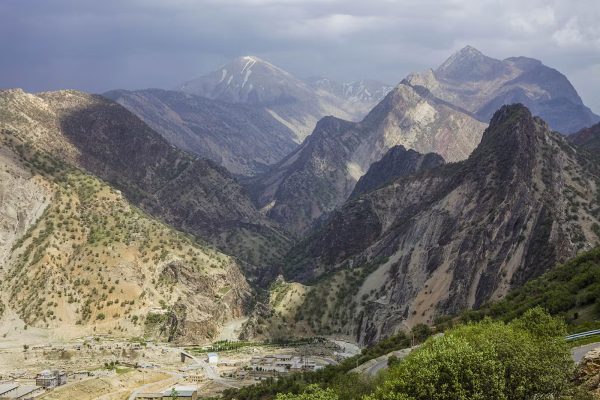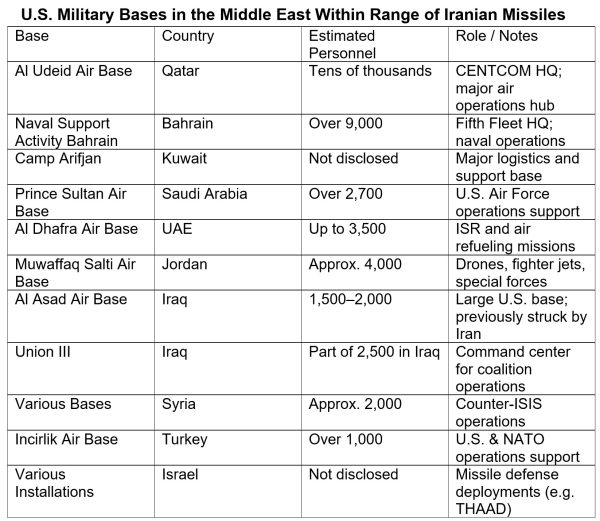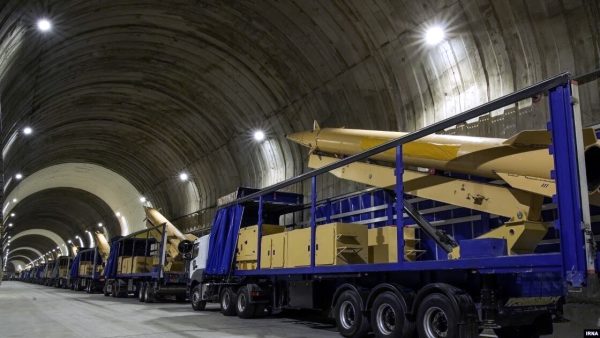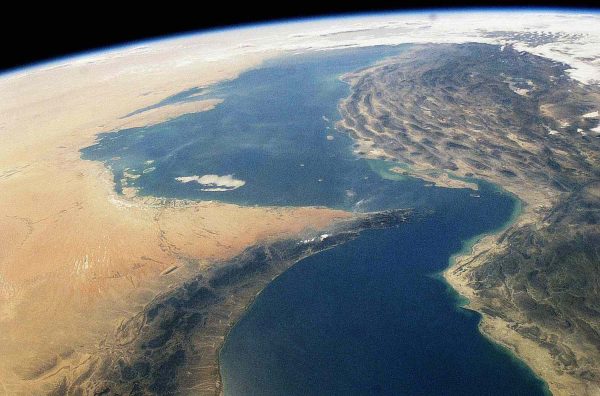The 9/11 attack on the U.S. triggered a series of disastrous wars in the Mideast in which the U.S. pursued the goals of overthrowing despots, securing oil supplies, and removing any real or potential military threats to Israel. The result was a large expenditure of blood and treasure for very little geopolitical gain and the destruction and/or destabilization of Afghanistan, Iraq, Libya, and Syria. Only Iran escaped this ruinous program of aggression in the Mideast. But Iran has remained in the crosshairs of Israel, which considers Iran the last regional power posing a threat. Israel continues its efforts to draw the U.S. into a war with Iran. I will explain why attacking Iran would be a foolish action harmful to the interests of the U.S.
Size Matters
Iran is a much bigger and more populous country than any nation the U.S. has attacked in the Mideast. To depose the regime and eliminate all Iranian military facilities, an invasion would be necessary. Because Iran is four times the size of Iraq (636,400 sq. mi. vs 169,200 sq. mi.) and three times more populous (88 million vs 25 million), a U.S. army of over half a million troops would be required for an attempt to conquer Iran, and this would likely require conscription to supply the necessary soldiers. U.S. Casualties in a ground war in Iran would probably be several multiples greater that those incurred in Iraq (approximately 3,400 KIA and 32,000 wounded in Iraq).
Not only is Iran a big country, it has a large mountainous region, the Zagros range, stretching over 900 miles along its western border. The steep terrain and narrow passes would pose substantial obstacles for any ground invasion force and would facilitate the same defensive tactics employed by the Taliban in similar terrain in Afghanistan.
Zagros Mountains – Welcome to Iran
Although an extended bombing campaign could destroy many of Iran’s military assets, it would be unlikely to secure a capitulation of the regime, and sufficient Iranian weaponry would remain to inflict serious damage on U.S. bases in the region. With an estimated arsenal of over 1,000 ballistic missiles capable of striking U.S. forces in the Mideast, Iran could inflict significant casualties on U.S. personnel, even if there were no ground invasion of Iran.
U.S. Mideast Bases – assets or targets?
Iranian missiles – an adequate deterrent?
The vulnerability of U.S. forces to Iranian attacks is a key reason why Israel may be able to draw the U.S. into a war with Iran. An Israeli strike against Iran would likely trigger retaliation against U.S. forces believed to have enabled the attack. Pro-war Israelis assume that once there are American casualties the U.S. would join in the campaign.
Economic Disruption
A full-scale regional war between the U.S. and Iran would involve the closure of the Straight of Hormuz and the destruction of oil production and export facilities in Iran, Saudi Arabia, and the Gulf States. Such a conflict could result in a doubling of oil prices, with severe impacts on the world economy. The longer the duration of the war, the more extensive would be the economic damage. The Houthis in Yemen, with far less military capability than Iran, have effectively cut off most shipping in the Red Sea for many months with periodic missile attacks. It is likely that Iran could accomplish a much greater disruption to trade than the Houthis.
Straight of Hormuz – energy choke point
Damage to Israel
Israel has made serious misjudgements of military situations in the past: the Suez Operation, the Yom Kippur War, and the October 7 Hamas attack all revealed failures of intelligence and miscalculations of risk. Launching a war against Iran exposes Israel to serious risks if its intelligence estimates are faulty. If Israel has underestimated the numbers and accuracy of Iran’s missile arsenal, or overestimated its ability to pre-emptively destroy the missiles, it will face devastating retaliatory attacks. If Israel has overestimated the capacity of its anti-missile defenses, it will suffer the loss of critical civilian infrastructure, such as power plants, desalinization facilities, fuel storage sites, and offshore gas production rigs. Even after recovering from such a calamity, a weakened Israel would still be surrounded by hostile neighbors further antagonized by yet another episode of terrible destruction.
Cultural Devastation
Apart from the grave military and economic dangers of war with Iran, there is the hazard of loss of irreplaceable cultural sites and artifacts. Iran is an ancient nation with a rich history spanning millenia. A large-scale war with Iran would risk the destruction, damage, and looting of many great monuments of Persian and Islamic civilization. The failure of invading U.S. forces to prevent widespread destruction and looting of cultural sites in Iraq indicates the magnitude of this danger.
Jameh Mosque in Isfahan – future collateral damage site?
Conclusion
Rational analysis is powerless against entrenched ideology, and the ideology of the U.S. neocons has thus far been impervious to negative outcomes. They view military and political failures as evidence of insufficient application of military force, which they consider the universal remedy for America’s international difficulties. If President Trump is swayed by the Israel lobby and the war hawks in his cabinet, he will add yet another blunder to the sad record of misguided U.S. military adventures in the Mideast and accelerate the decline of U.S. hegemony. Talleyrand said of the Bourbon monarchs “They have learned nothing and forgotten nothing.” Let us hope that these words will not be applicable to the U.S. as we approach the brink of war with Iran.







Strong article overall. I’m not sure if it is the case that Israeli intelligence miscalculated on October 7th. One can argue that this is the result the Israeli government wanted. They’re now in a position to expand their territory into Gaza, West Bank, Lebanon, and Syria.
Another variable, unmentioned, how should we expect China and Russia to respond? Would they just watch? Or would they provide meaningful military assistance?
PS — it’s not clear if the cultural destruction is actually a disincentive to people in power. They might see it as an advantage.
“it’s not clear if the cultural destruction is actually a disincentive to people in power. “
In Gaza (and to a smaller extent in Lebanon), Israelis showed no compunction whatsoever in destroying all cultural artifacts — from libraries to archaeological and historical monuments. They will do the same against Iran if they feel they can gain an advantage, even infinitesimal, in doing so.
Apart from that, the discussion about how the USA and Israel may proceed against Iran has been going on at NC for quite a while, so I summarize my views.
1) Iran is way too large and populous, so an invasion is infeasible — and both the USA and Israel, which do not even have token expeditionary forces near by, know this; hence, they will not attempt anything like that.
2) Iranian military and atomic assets are located in fortified positions well-defended with AA units. They can sustain and survive attacks. Civilian infrastructure is not hardened, and Iranian forces cannot hope to protect it with a dense enough AA shield.
3) Hence, Israel and the USA will concentrate their attacks on civilian infrastructure — energy, water, etc. This is how they proceeded in Gaza and Lebanon (since they could not destroy the military infrastructure of Hamas and Hezbollah), and how they are proceeding now in Yemen. Therefore, this is how they will proceed with Iran.
4) Before Iran can be attacked, Yemen must be crushed, because neither the USA nor Israel can let such a pugnacious foe operate in their rear while they are dealing with Iran. Hence the massive daily bombardments on Ansarallah-controlled territory — targeting mostly civilian infrastructure (harbours, oil storage, airport, power stations).
What I have no idea is what kind of retaliation Iran will engage in, given that both Israel and the USA have enough crazies ready to go nuclear.
I think your summary appears very rational and level headed, with Queen Elizabeth’s caveat that we should not like war, as they are costly and the outcomes uncertain.
What do you think Russia and China might do if the USA bombs the civilian infrastructure in Iran?
Nothing.
China may get involved if energy infrastructure is at risk – but that may obviously also limit what they allow Iran to do.
The evangelical faction of this administration would be cheering this on as a start to their goal of Armageddon.
One big obstacle in my mind is that I’m pretty sure Iran will not tolerate attacks coming from any Gulf state territory. Saudi’s have a lot on the line here and they have access to Trump to make their argument and money to buy the peace. I think this is the main reason US has not conducted any strikes against Iran, Saudis are reigning things in behind the scenes and likely have allies in Hegseth and the rest of America First cabal.
This may be why we are seeing a purge in the DoD and weakening of Hegseth’s position, while Mike Waltz remains unscathed. Removal of Hegseth and the rest of America First staffers leaves fewer voices that oppose the war with Iran. I am still skeptical that this will be sufficient to push Trump into supporting the war, Saudis are heavily invested in the Trump family and are likely much more influential with him than the Israel lobby.
Except the damage to Hegseth’s position/status is completely self-inflicted. While I can totally see this as a happy occurrence for several interested parties, that is a far cry from an a planned strategy to change the position of the DoD with regards to Iran.
The Saudis are also scared of Iranian missiles and have zero trust in US air defenses.
Assuming that for some reason we decided to invade Iran it would take more than a half million troops.
Iran with 90 million people could, if needed, mobilize a significant portion of their population. Even if it was only 25% you are talking over 22 million people available to defend their country and given our history with Iran, they would be a highly motivated 22 million people.
I would think you would need between 2 and 3 million troops to even have a chance at subduing a country the size of Iran.
For comparison, Iran’s territory is five times larger than that of Vietnam, and in 1965 Vietnam had less than half as many people.
The 500K number sounded way too low to me as well. off the top of my head:
– How much territory could we even control with that #? I assume a few dozen bases and outposts… maybe a couple cities along the Persian Gulf coast. That still provides a lot of territory for Iran to use to marshal resources and plan attacks. I doubt very much we could get anywhere near Tehran (278 miles from the closest point at the Iraqi border – assuming we could stage an invasion from that country – and 386 miles from the Persian Gulf coast). Baghdad was only 270 miles from our bases in Kuwait, and we had complete air superiority that entire way.
– as far as I know, we haven’t fought a major ground operation since attack drones and swarms have become commonplace on battlefields. If the Houthis could hit Saudi oil infrastructure well inside that country in 2021 (link), what could Iran do in 2025? A lot more? And that’s even aside from their ballistic missile stockpile.
– As noted, we’re struggling to subdue the Houthis right now, and it seems like we’ve given up on attempting to destroy their forces and equipment and pivoted to just bombing the civilian population & infrastructure there.
– I assume our combat capability has degraded even further since we rolled through Iraq to Baghdad in 2003.
– In 2003, it seemed like there was still some positive morale in the ranks, and incentive to recruitment in the U.S., left over from the September 11th attacks. That’s LOOOOONG gone… who wants to sign up to fight in this war?
Order of battle and logistics.
If US could put together an invasion force for Iran what ports would it capture and how far are they from military objectives? No suitable Iran ports if U.S. and allies had ships.
Would they transit from Turkiye? Afghanistan is out and Pakistan is wrong side from Atlantic shipping.
The build up time is long, a large part of National Guard would mobilize and train up several months in U.S. That prep would allow setting up forward supply points etc. These would require sealift to get to invasion point where Iran depots would follow. Daunting, more than enough opportunities to bomb depots.
During the year or so build up is an air war. Distances are similar to Guam to North Vietnam or longer. Would Turkiye allow heavy operations out of the 2 Cold War, NATO air bases in East Turkiye? Can these be defended?
What other air bases? Iraq, Jordan, Israel, UAE. Diego Garcia is long way.
Huge logistic tail for air war extending deep into Iran!
All of that air wars not much utility., ground war is only complement to yield success.
Look at what the first 500 sorties has achieved the past month or so in Yemen, who has only air defense against loitering slow drones.
The JCS logistics staff probably told Hegseth “you cannot get all that there”.
If the neocons don’t listen….
Aircraft carriers have to stay too far out to be safe…..Says this AF vet.
Because the peer adversary we’ve decided to attack through Ukraine has had the restraint to not manifest feedback directly to Whitehall or the White House, our Symbol Manipulator in Chief and his minions can maintain the the Curtis LeMay fiction we can bomb our way to success.
It’s never worked, but there’s never been consequences for the failed decision makers either.
Reality for these people is their experience of it, and they’re so wildly narcissistic and sociopathic, and have been so handsomely rewarded for their anti-sociability, why would they behave differently? Some giant, protuberant reality needs to intrude, and the sooner the better.
Maybe it’s Tehran that wants war. Unfortunately, due to sanctions, anti-government protests in Iran have become more frequent in recent years due to the difficulties of living. In addition, anti-Iranian propaganda from outside the country has become more intense over the years. However, the Iranian people will be forced to unite, whether they want to or not, when a U.S.-made bomb is about to rain down on them.
I don’t get the sense that Iran wants war. What are you basing that on? Israel has repeatedly given them a casus belli several times in the last couple years, as did Trump during his first presidency, and at most they retaliated in a very limited sense, and more or less gave advance notice of that.
Even from my lowly position as a mere consumer of what I read on the internet, I’ve seen absolutely nothing that would even support a claim that Iran wants war.
Based on the hard realities considered in this piece, and others not mentioned, it would seem that the only options available for the USA/Israel decision makers are nuke ’em or nothing. The in-betweens will irreversibly change the world order in a major way. As would the nuclear option.
It is possible that Trump is aware of this and some part of his brain will not allow such damage to his ego and legacy.
That thought occurred to me…. And whilst I don’t believe Iran has “the bomb” I’m wondering how many of its supporters are capable of setting off a dirty bomb somewhere
Stop poking Iran!
Apparently the Israeli “plan” if you can call it that is for Israeli and US bombers to kill the Iranian leadership and then the supposedly repressed masses will rise up to greet us with flowers and candy.
In other words it’s the war in Iraq plan which was also at the behest of the Israelis.
A far easier plan would be for the USG to politically assassinate Bibi by making it clear we will no longer support with weapons until he is replaced. This might also forestall that Israeli civil war that Alastair Crooke keeps talking about.
So the Biden/Trump policy is not even in support of what’s best for Israel but is in reality what’s best for Netanyahu and his American supporters. Antisemitic much? (On a reality level.)
The foolishness of longstanding US policy re Israel does raise the question of who is wagging whom but every president including Bush jr has balked at taking on the 90 million and their oil market threat. Reagan did try to get the Iraqis to make war with Iran and take them down but that didn’t work either. Maybe we should just leave them alone.
The likeliest scenario, I think, is some kind of joint US / Israel bombing campaign, which it’s hard to believe will succeed, given past results.
I don’t think either will be willing to provide the ground forces (who will have to do some serious dying), so that’s a big gap – they broke Iraq, so they can’t, Pakistan and Afghanistan seem pretty unlikely, and the Azeris and Kurds too few. They could try Turkey, but that blade is as likely to cut the wielder as the target.
I think this is much more likely to be a phony war in fits and starts than an opener for WW3, but given the lunatics in charge of the collective west, who can know ?